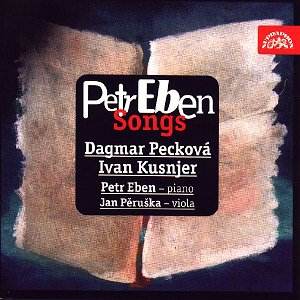Lest anyone be in any
doubt that Petr Eben is a worthy heir to his fellow countryman Leoö
JanŠček, I would suggest that they listen to this wonderful collection
of five song cycles, all of them beautiful examples of the highly
personal yet intensely Czech qualities of Ebenís music as well as his
innate sensitivity to both the poetry he sets (much of it being of personal
significance to the composer) and the qualities of the human voice.
Although written over a period of just twelve years
the five cycles reflect clearly the composerís journey from the Janáček-imbued
language of his earlier works to the melodically and harmonically freer,
indeed more adventurous sound world of his mature music.
Of the three earliest cycles the Six Love Songs
are perhaps the closest to Janácek in both language and spirit.
Eben here uses medieval texts (with the
exception of one setting of a poem by Villon) encompassing Czech, German,
English, Italian and French and reflecting Ebenís abilities as a multi-linguist.
Sung impeccably by Dagmar PeckovŠ the JanŠček influence is perhaps
most discernible in the piano writing but the results can be very much
Ebenís own (try the opening Kind Night or the fifth song
Send Me No Messages). In The Most Secret Songs, for low
voice and piano of the following year, Eben turns to lyric verse by
a number of poets close to his heart whilst including verse of Eastern
origin (Abu Saíid and Saíd-ud-din Hamawi), as well as a brief setting
of his own words in the sixth song, Parting. As in all of these
cycles one senses a deep feeling of personal association with the texts,
heightened by the composerís own sensitive accompaniment to the charismatic
singing of Ivan Kusnjer. Kusnjer is equally fine in the Songs from
Tĕöín Country of the same year, in which Eben turns
to the folk music of northern Moravia, the area of which his wife is
a native. These eleven fleeting songs, most of which are well under
two minutes in length, are wonderfully characterful, by turns lyrical,
haunting (the atmospheric Come Sunday Morning is particularly
memorable) and at times boisterously good humoured (Hey, Round about
Têöín and the concluding The Girls they Boast).
Kusnjer projects himself with strength and an infectious sense of enjoyment.
Of the two later cycles, indeed of all the cycles,
it is the 1963 settings of Loveless Songs that stand alone both
for the dark intensity of their subject matter and the inspired, wholly
appropriate hues of their viola accompaniment, the perfect match for
Peckováís rich mezzo-soprano voice. The texts explore the complex
emotional world of loveless relationships, whether those locked in long-standing
unhappiness or the fleeting feelings of lovelessness that are common
to many romantic relationships, resulting in a kind of anti-love song
cycle. Ebenís skill in both inter-twining and separating the vocal and
viola parts makes for fascinating, if emotionally tense listening, adding
to the unusual nature of this most overtly "serious" of the
five cycles. Rilke is a poet who has been close to Ebenís heart for
many years and it is therefore no surprise that he should turn to the
German poetís work, albeit clearly after much thought, evident in the
fact that it took until 1961 for him to produce a cycle setting six
Rilke poems for middle voice and piano. The language here is more characteristically
lyrical than is displayed in the bitterness, even anger of the Loveless
Songs, the final song, Premonition, being particularly fine
and bringing to mind Frank Martin in the central chordal sequence from
1í05".
Like the music of Frank Martin, Petr Ebenís work has
a thoughtful, sometimes spiritual intensity and beauty that places him
amongst the most personal and still, I think, underrated composers (in
this country at least) of his generation. These song cycles are finely
representative of his music and in performances as committed as these,
perhaps even definitive given the composerís presence and able accompaniment,
it is to be hoped that we will see future recordings demonstrating the
wider breadth of his output beyond the realms of the choral and organ
music.
Christopher Thomas.


